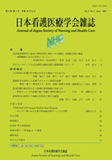Japanese
English
- 有料閲覧
- Abstract 文献概要
- 参考文献 Reference
- サイト内被引用 Cited by
(要旨)
この研究の目的は、日本に在住しているカンボディア人の伝統的な健康実践と援助関係へのニーズ、およびその文化的背景を明らかにすることである。研究方法は、レイニンガーの民族看護学を用いた。対象者は、8名のカンボディア人を主要情報提供者とした。さらに4名の日本人と18名のカンボディア人を一般情報提供者とした。データ収集は、情報提供者に対するインタビューとレイニンガーの観察—参加—再確認の2つの方法を用いた。分析の結果、以下の特徴が抽出された。
(1)伝統的な療法を産後の回復に向け、また一般的な身体的苦痛の回復に向けて行なう。
(2)赤ちゃんの健康を願うための儀式を行なう。
(3)患者は医療者の行為に「やさしさ」を求め、医療者に対して「まかせる」態度をもつ。
(4)健康に問題があるとき、彼らは、家族・友人の行為に「付き添う」、「心配する」、「助ける」を求め、家族・友人を「頼りにする」という態度をもつ。
以上のような結果は、異文化を考慮したケアに示唆を与えるものである。
Abstract
The purpose of this study is to understand the traditional practice for health and the needs for traditional support among Cambodians living in Japan as well as their cultural background. Leininger's ethnonursing method was used for the study. Eight Cambodians participated to be selected as key informants and twenty two as general informants(4 Japanese and 18 Cambodians). Data were sourced from interviews with the informants and Leininger's method of observation —participation— reflection. With the analysis of the data obtained, following characteristics were discovered:(1)They practice two types of traditional way of treatment, one to recover after delivery, and another to recover from general physical pains.(2)They do traditional rituals wishing a newborn baby's health.(3)Patients expect "kindness" in a medical practice, and they have attitudes of "comitting themselves" toward medical staffs.(4)When they have health problems, they expect to "be stayed with", "be thought of" and "assisted" by their family and friends. They have attitudes of "relying on" their family and friends. Above results can suggest new perspectives in nursing to consider for cross-culture.
Copyright © 2007, Japan Society of Nursing and Health Care All rights reserved.


